The Art of Trolling: A Philosophical History of Rhetoric

The history of trolling is a history of rhetoric. This particular history of rhetoric is steeped in philosophy and mythology, spanning across cultures, continents, and time. Although trolling principally correlates with the rising popularity of digital spaces native to social media, blogs, and comment sections on websites, trolling as a form of rhetoric predates the internet entirely. But this does not mean that digital spaces have not enabled a new kind of trolling to evolve within the advent of the internet. The goal of this investigation is not to provide a definitive history of trolling or its involvement within specific subsets of internet trolls, e.g. the Alt-Right Movement. Instead, I mean this as a thoughtful meditation upon how the phenomena we understand as “trolling” has emerged within multiple cultures and has transformed within recent memory. Looking at these origins, we may glean that although trolling has since gathered dubious and often divisive connotations, its origins stem from “heroic” traditions and celebrated figureheads in academia.
Trolling Defined
Trolling itself may be understood as any of the following:
- To “make a deliberately offensive or provocative online post with the aim of upsetting someone or eliciting an angry response from them” (Oxford Living Dictionary).
- “The art of deliberately, cleverly, and secretly pissing people off, usually via the internet, using dialogue… The most essential part of trolling is convincing your victim that either a) truly believe in what you are saying, no matter how outrageous, or b) give your victim malicious instructions, under the guise of help.” (Urban Dictionary).
- To sow “discord on the Internet by starting arguments or upsetting people, by posting inflammatory, extraneous, or off-topic messages in an online community (such as a newsgroup, forum, chat room, or blog) with the intent of provoking readers into an emotional response, or of otherwise disrupting normal, on-topic discussion, often for the troll’s amusement” (Wikipedia).
Although Urban Dictionary and Wikipedia may arguably be less scholarly sources than the Oxford Living Dictionary, granted that trolling as a word used in this way is a more recent phenomenon, we must turn to sources like Urban Dictionary and Wikipedia until the more “academy appropriate” tracts produces more thorough understandings of “the art” of trolling. Each definition provided above highlights a different aspect of a similar phenomena, although these definitions all place that phenomena within a digital space. For our purposes here, as implied within the abbreviated history of rhetoric, trolling is not limited to digital spaces.
The Origins of Rhetoric
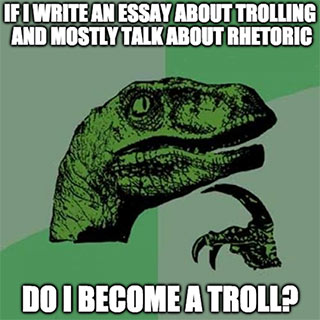
If each act of individual trolling is an act of rhetoric in action, then what is rhetoric itself? Rhetoric is a term frequently used in popular culture as a way to dismiss a person’s words/thoughts. Usually this dismissal involves calling the person in question “biased” or “manipulative,” suggesting that there isn’t any “substance” informing an author/speaker’s claims. Instead, the author/speaker just uses “empty rhetoric.” While this understanding of rhetoric is not without a historical grounding, this understanding is somewhat misinformative. Rhetoric is far more complex than this, and it is for this reason that I provide the following abbreviated history of the subject before detailing contemporary definitions of trolling. This history illustrates that trolling can be traced back at least to Ancient Greece.
Please note my history here is largely concerned with a Western tradition as that is where my expertise lies, but I find it pertinent to stress that there are other traditions of rhetoric, other rhetorics, beyond what I write here. For those interested in further pursuing a larger investigation into the History of Rhetoric, Patricia Bizzell and Bruce Herzberg have a mammoth tome called The Rhetorical Tradition: From Classical Times to Present.
Rhetoric’s definition has changed largely over the course of time within the Western tradition, beginning with its first appearance in Gorgias, its revisitation in Plato’s Phaedrus, and carrying onward into the 21st century, which has expanded rhetoric’s focuses to include digital, disability, and intersectional rhetorics. In its earliest use in Gorgias, or On Rhetoric, Plato uses rhetoric as a way to dismiss a group of traveling teachers known as the Sophists, most specifically the Sophist who appears within the dialogue and puts up with berating from Socrates, Gorgias himself. Gorgias, Protagoras, Aspasia, and other Sophists represent a tradition of skeptical thought that emphasizes the importance of question asking, the relative nature of personal experiences in relation to perception (as opposed to thinking in broad, universal statements), and challenging cultural norms associated with hegemony.
The Sophists are the first rhetoricians within the Western tradition, but they do not necessarily use the word “rhetoric” themselves to describe what they do, even though Gorgias uses it himself within the Platonic dialogue that shares his name (88). Instead that word comes from either Plato or Socrates, who apply the word to the Sophists as a way to discredit them. (The reason why it is unclear whether Plato or Socrates invented the term stems partially from the fact that every piece of Socrates’s writing no longer exists; what we know of Socrates is principally in the writings of other authors, principally Plato.) These Philosophers perceived the Sophists as deceivers, both of the populace and of their students, with the principal mission of the Sophists to teach their students how to lie well (Bizzell and Herzberg 80).
Because of this, Plato and Socrates presents rhetoric as immoral, the antithesis of their noble philosophy that is dedicated to the pursuit of knowledge based within absolute truth. This immorality, these philosophers seem to believe, would also be the undoing of Athenian democracy. Socrates even goes as far within Gorgias to claim that not only will rhetoric disrupt justice and Sophistry will disrupt legislation (98), he argues that rhetoric can condemn one’s soul to Tartarus, an Ancient Greek counterpart akin to the Christian Hell.
In a word, whatever sort of bodily appearance a man had acquired in life, that is manifest also after his death either wholly or in the main for some time. And so it seems to me that the same is the case with the soul too… when a man’s soul is stripped bare of the body, all of its natural gifts, and the experiences added to that soul as a result of his various pursuits, are manifest in it. So when they arrive in presence of their judge… Rhadamanthus sets before him and surveys the soul of each… he perceives the utter unhealthiness of his soul, striped all over with the scourge, and a mass of wounds, the work of perjuries and injustice; where every act has left its smirch upon his soul, where all is awry through falsehood and imposture, where all is awry through falsehood and imposture… Beholding this he [Rhadamanthus] sends it [the soul] away in dishonor straight to the place of custody, where on its arrival it is to endure sufferings that are fitting. (Gorgias 136-137)
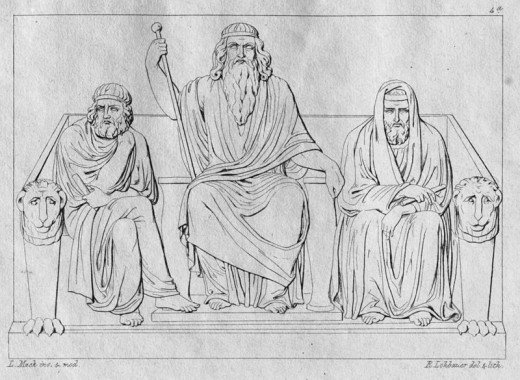
(Source)
Considering the Sophists and Philosophers operated competing schools within Classical Athens, there is likely a political undertone to Plato’s and Socrates’s use of rhetoric within this piece, especially in regards to its ability to condemn one’s soul to a place of torture, making Gorgias an artifact of the ancient world that depicts a possible early form of “trolling.” Based on how Plato depicts Socrates within this dialogue, having him outwit and shut down both Gorgias and his pupils, what the reader encounters is not a discussion amongst conversation partners contributing their thoughts equally and productively, but a fairly one-sided discussion where Socrates sets a series of verbal and logical traps to make his opposition incapable of responding in a reasonable fashion. Socrates even goes as far as to set a double standard, telling Gorgias the same time that he is asking the Sophist to engage within a dialogue that if he is to speak with Socrates, he can only respond using the briefest responses (88). Meanwhile, Socrates throughout the dialogue uses lengthy responses- some even last for multiple pages.
If we do accept this as an ancient example of trolling, this means that trolling traces back to the inception of rhetoric and could possible accompany the term throughout the entirety of its history, albeit as I make clear further on, within the Western tradition, at least, there is a moment where trolling seems to diverge from rhetoric as rhetoric began to acquire new applications.
While Plato and Socrates may originally taught their pupils that manipulative rhetoric is a form of evil, Plato later revises this stance within another dialogue, Phaedrus. As a dialogue, Phaedrus is far more cosmological and mythological than Gorgias. Here Socrates invokes imagery of Gods and Goddesses, along with souls riding upon flying chariots, as ways of exploring the causes of madness and types of love. Socrates uses this imagery to reverse his position from Gorgias, saying now that rhetoric can be good and that the rhetoric that leads people towards the divine truth is the purest rhetoric. Socrates also posits an incredibly complex system of reincarnation that places human beings into a 9-layered caste system (150). At the top of this hierarchy stands the Philosophers, for their love of truth elevates their souls into the highest of beings (151). Towards the bottom at this hierarchy, ranking in 8th place, are the Sophists, who are considered equal to Demagogues and only slightly better than the Tyrants who occupy the 9th level (150). Rhetoric has the ability to raise or lower the rankings of souls upon reincarnation, depending on how well that rhetoric is oriented towards the love of truth.
While trolling may not seem to be as immediately apparent within Phaedrus, as it may appear within Gorgias, there are at least three possible ways that this dialogue can relate to this particular rhetorical art. Considering the context of how Plato sets the dialogue within Phaedrus up between Socrates and a young man named Phaedrus that Socrates appears to be enamored by, the purpose of this dialogue is deeply deceptive, using this meditation upon purity and love as a possible way to seduce Phaedrus without Socrates necessarily having a sincere desire to care for him beyond immediate pleasure. To a lesser extent, if we read this exchange as reflective of Socrates genuine feelings, then we may also read this as reinforcing the idea that the Gorgias dialogue is an act of trolling, that if Socrates can accept rhetoric as he does here, then his dialogue with Gorgias and his students stems from a desire to exploit Sophists for his own enjoyment. A third possibility lies within Paul Johnson’s Socrates, wherein Johnson reflects on how Plato may have used Socrates’s image to deceive others into thinking that Plato’s ideas stem from a more authoritative source.
Being an intellectual, Plato thought that to spread his ideas was far more important than to preserve Socrates as a historic, integrated human being. Using Socrates as a doll was, he saw, the easiest way to bring about this philosophical dispersal. So the act of transforming a living, historical thinker into a mindless, speaking doll… became in Plato’s eyes a positive virtue. (Johnson 11)
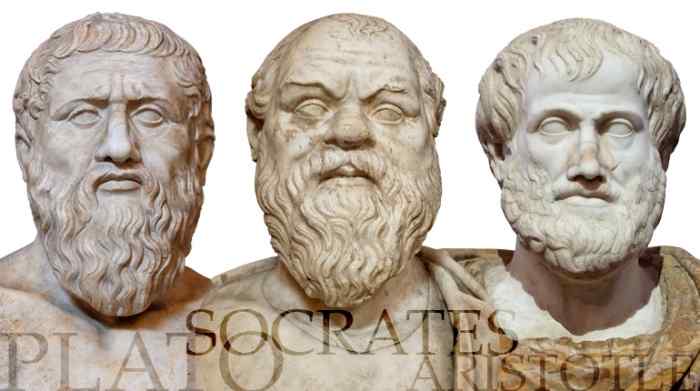
Rhetoric and philosophy may have begun as oppositional forces, as we see expressed within these dialogues by Plato, but following Plato, rhetoric begins to become assimilated into philosophy. This assimilation begins with Aristotle, Plato’s pupil, who describes rhetoric as “seeing the available modes of persuasion” as opposed to manipulation or situated within the aforementioned complex system of reincarnation (179). Yet Aristotle’s assimilation of rhetoric into philosophy does not mean Aristotle treats the Sophists any better than his philosophical predecessors. Aristotle separates rhetoric from the Sophists by defining Rhetoricians in opposition to the Sophists (181). Whereas the Sophists are historically the original Rhetoricians, Aristotle strips the Sophists of their knowledge and declares them as masters of faculty without any moral purpose (181). Aristotle’s rhetoric may principally concern itself with the means of persuasion, but it appears designed to also rewrite history in a grand act of possible philosophical trolling that denies the Sophists their contributions to rhetoric. Sophistry eventually evolved into a derogatory term and the Sophists themselves became lost to history because of Socrates, Plato, and Aristotle, until Hegel rediscovered them in the 19th century (Jarratt 4).
Any accusations of possible trolling seems to fade away from rhetoric following Aristotle’s redefinition. After the next major rhetorician, Cicero, alters the definition of rhetoric by dividing it into 5 canons: Invention, Arrangement, Style, Memory, and Delivery (Bizzell and Herzberg 3), the definition of rhetoric continued through a series of revolutions, concerning itself with education and morality through Quintilian, Christian doctrine through Augustine, and courtly behavior through Castiglione. While rhetoric traditionally focuses upon concepts such as how an author/orator can successfully persuade an audience into supporting a given position, the rhetoric of trolling illustrates a situation wherein the author/orator is concerned principally with alienating/enraging an audience. Those authors/orators will be referred to here as within this context as trolls.
The Mythic Origins of Trolling
In the process of investigating the history of rhetoric, Socrates, Plato, and Aristotle all appear to exhibit behavior that adheres to the Urban Dictionary definition of trolling, quoted above, “the art of deliberately, cleverly, and secretly pissing people off… using dialogue.” However, even if we do decide that their behaviors towards the Sophists can be considered trollish behavior, this does not mean that trolls did not exist prior to the period that produced these Athenian Philosophers. Trolls of this variety exist in myth- not as literal trolls, as these mythological figures are often easily out-duped, but as Tricksters.
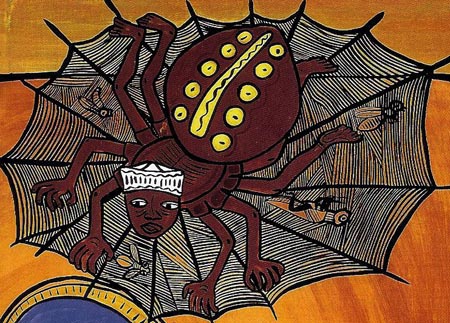
(Source)
A handful of figures from world mythologies, Hermes, Odysseus, Papa Legba, Coyote, Raven, Loki, Monkey, and Eshu all represent variations of the troll within the character archetype of the Trickster. Each of these figures are involved within mythologies wherein they too “deliberately, cleverly, and secretly” use their words to deceive another party for their own amusement. Sometimes, as appears to be case with our trio of philosophers, these Tricksters have their own political reasons for their individual acts of trolling, such as Hermes’s desire to evade trouble with Apollo, Papa Legba with his desire to get revenge on his mother, Loki with his disdain for the Aesir, or Monkey’s need to protect his subjects from the monster that is terrorizing them. Other times, as is the case with Odysseus in his famous encounter with Polyphemus within Homer’s Odyssey, survival rests upon the trickster’s ability to troll and conceal one’s identity through clever wordplay. A much more detailed analysis of these Tricksters appears within Lewis Hyde’s Trickster Makes This World, albeit Hyde does not explicitly investigate inherent troll characteristics within the Trickster archetype, nor does Hyde cover all of these Tricksters equally.
But what is a Trickster? Are there any aspects of a Trickster that differs from a troll? Hyde writes,
In short, the trickster is a boundary-crosser. Every group has its edge, its sense of in and out, and trickster is always there, at the gates of the city and the gates of life, making sure there is commerce. He also attends the internal boundaries by which groups articulate their social life. We constantly distinguish right and wrong, sacred and profane, clean and dirty, male and female, young and old, living and dead- and in every case trickster will cross the line and confuse the distinction. Trickster is the creative idiot, therefore, the wise fool, the gray-haired baby, the cross-dresser, the speaker of sacred profanities. Where someone’s sense of honorable behavior has left him unable to act, trickster will appear to suggest amoral action, something right/wrong that will give life going again. Trickster is the mythic embodiment of ambiguity and ambivalence, doubleness and duplicity, contradiction and paradox. (7)
A Trickster is subtle. A troll is often openly aggressive, though a rhetorically savvy troll, much like these Tricksters, can be subtle. A troll does not need to be noble or likable, but a Trickster figure usually is both noble and likable, even if the trollish Trickster uses deception to subvert norms and social order. The lone exception here amongst these trollish Tricksters is perhaps Loki. But this does not mean that Loki has been treated unfairly over the course of history. His public image today may very well be a byproduct of well-placed trickery.

Christian writer Snorri Sturluson, may have rewritten Loki in the process of creating his work, the prose Edda- a foundational text for our understandings of Norse mythology. Hyde writes, “there are really two eras of Norse mythology, and two Lokis, the Christian lens having turned Snorri’s Loki darker and more demonic than the Loki who inhabits the earlier poems” (104). In this instance, the fate of Loki parallels the fate of the Sophists. He is targeted by a writer whose ideology recasts him in a negative light.
As a result, Loki’s nobility and likability become expelled from his identity. His character becomes rewritten. New mythologies become attributed to him, and a new figure takes the place of the old celebrated God. What is this new Loki but an avatar of Snorri sent to troll Asgardians for being Pagan Gods just as the Athenian Philosophers’ depictions of the Sophists troll the actual Sophists for holding antithetical beliefs?
In an era before the internet, trolling could not occupy digital space, but it could occupy oral space and written space. Loki happens to be an artifact from this written space of how trolling may be done for a religious agenda. The depictions of the Sophists consequently are artifacts of political trolling within this same kind of written space. Through philosophy, we may see the troll as a scrutinizer of politics. Through mythology, we may see the Trickster either as a prototype of the troll figure or a specific kind of troll whose charisma and wit transforms the troll into an object of worship or emulation.
The Internet Troll
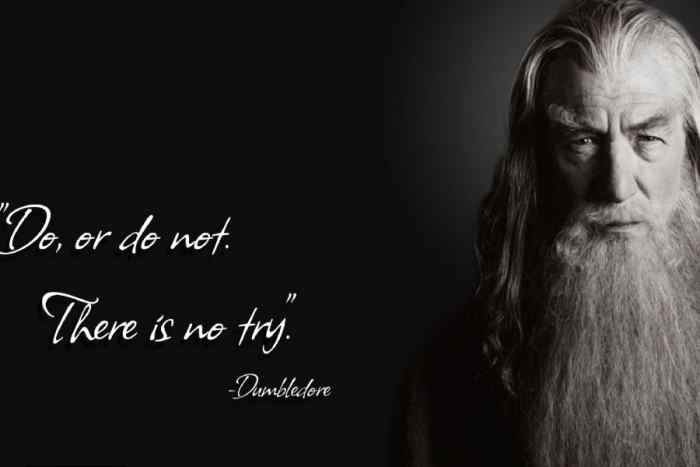
While some may try to monolithize a troll’s motivation at any point in history, making the case that a troll’s only agenda is to find amusement at others’ expense, I argue that this motivation can be multifaceted. Such is the case with Socrates, Plato, Aristotle, the Tricksters, and Snorri Sturluson. It is this multifaceted series of motivations that is able to make these kinds of trolls into respectable figures worth idolizing.
Conversely, the internet troll, which often can have a monolithized motivation, is usually less respectable unless the ideologies that troll is attacking are one’s an individual does not agree with or subscribe to dogmatically. Even then, this does not usually transform the troll into a culture hero. Instead it turns the troll into a jester figure who provides a momentary amusement and not much more.
This is not to say that Internet trolls cannot have multifaceted motivations. They can. An excellent example of this is James Veitch, who makes a solid hobby out of replying to scam emails in order to prevent scammers from taking advantage of less rhetorically savvy people.
Veitch is a troll who uses his rhetoric to attack the same time he uses it to defend a group of people. In this way, he is far more in line with Tricksters like Odysseus and Monkey than he is with Snorri Sturluson or Aristotle. He sends these emails for his own enjoyment, to exercise his wit, but he has a moral purpose informing his actions. Consider what Veitch says within his TedTalk, “This is What Happens When You Reply to Spam Email.”
Crazy stuff happens when you start replying to scam emails. It’s really difficult, and I highly recommend we do it. I don’t think what I’m doing is mean. There are a lot of people who do mean things to scammers. All I’m doing is wasting their time. And I think any time they’re spending with me is time they’re not spending scamming vulnerable adults out of their savings, right? (Veitch)

This is a far cry from the somewhat selfish politics informing the possible trolling found within the works of Plato, Socrates, and Aristotle. It is somewhat more in line with the kind of trolling we may associate with Snorri Sturluson, but even then the morality that informs Veitch’s actions here seems to be founded within a more “universal” notion of justice that doesn’t rewrite culture to convert others to his beliefs. Instead he uses humor as both a weapon and as a way of establishing a community.
Veitch crosses borders. He represents what a troll can be. A troll needn’t anger others for the sake of laughter alone. Veitch shows that a troll can have multiple purposes informing their actions, and that by having multiple purposes, a troll can become, in a sense, a modern-day culture hero like the Tricksters Hyde studies. While that troll may not be considered a hero by all members of a population, any troll has the capacity to see themselves as a hero. That capacity, like rhetoric itself, has a contingency for good and evil.
The problematic nature of the internet troll is that all trolls may perceive themselves as being culture heroes. Veitch may more easily be called both a troll and a hero because the agenda informing his trolling is apolitical. He does not seek to penalize others for subscribing to other ideologies than those he subscribes to. His primary concern is only to outwit the scammers and to use their rhetoric against them in a playful fashion.

Not all internet trolls with an agenda are playful like Veitch. In the advent of Donald Trump’s presidential bid, a malevolent internet troll presence has gained traction regarding what has since been called the Alt-Right Movement. Using rhetoric that can be classified as sexist, racist, xenophobic, anti-Semitic, homophobic, transphobic, or other variations of discriminatory language, the Alt-Right Trolls take pleasure in “triggering” liberal Internet users into side-stepping their positions and responding emotionally. Much like Socrates within Gorgias, the Alt-Right trolls use their victim’s emotional outbursts to highlight what the Alt-Right perceives as hypocrisies undermining liberal arguments and/or to shut down conversations that advocate against conservative values by denying opposing views from presenting any form of logical argument. It may not be outrageous to suggest that aggressive trolls like those within the Alt-Right Movement are analogous to the Athenian Philosophers. Clearly then, political trolling is not a new phenomenon, even if the digital spaces where this kind of trolling takes place are a fairly new to this kind of rhetorical art.
Digital spaces do, however, provide new opportunities for trolling that did not exist prior. Digital spaces give trolls an ability to maintain anonymity and a wider audience than they ever had access before. The rhetoric of the troll is not a new invention, but that rhetoric has changed as the mediums have changed. Whereas earlier forms of trolling relied on the power of words and necessitated that the troll have direct contact with a target audience, these digital spaces allow trolls to reach their audiences indirectly and to rely on the power of images and words.
The internet troll may, in fact, be far more sophisticated than trolls are often perceived within popular culture. Their politics may occasionally be questionable, condemnable even, but internet trolls occupy a position alongside cultural borders that allow the rest of us to better understand our roles within society. Like the Athenian Philosophers and the Tricksters, they bring ideologies into focus, into conflict. The internet troll calls back to the mythological past of various global cultures and forces us to consider what kinds of future may lay ahead for us. But equally important, if we do let the internet trolls point the way ahead, we must consider, as the Sophists did, what other alternatives exist beyond the borders that trolls make readily apparent.
We can, after all, troll a troll ourselves. We can use trolling to suppress an idea. But we can also use trolling to suppress oppressive entities or find ways of using trolling as a way to construct new ideas and knowledge. The troll is a genre, a model for writing or oratory that utilizes rhetoric in a deceitful way to achieve self-related goals. Just as writing may be used to affirm a variety of ethical and unethical positions, troll rhetoric too may occupy any position amongst a moral spectrum. The internet troll just happens to demonstrate another space where this rhetoric may be applied.
Works Cited
Bizzell, Patricia and Bruce Herzberg. The Rhetorical Tradition: Readings From Classical Traditions to Present. 2nd ed. Bedford/St.Martin’s, 2001.
Hyde, Lewis. Trickster Makes This World. North Point Press, 1999.
“Internet Troll.” Wikipedia. https://en.wikipedia.org/wiki/Internet_troll. Accessed 24 January 2017.
Jarratt, Susan C. Rereading the Sophists: Classical Rhetoric Reconfigured. Southern Illinois University Press, 1991.
Johnson, Paul. Socrates: A Man for Our Times. Penguin, 2011.
Plato, “Gorgias,” The Rhetorical Tradition: Readings From Classical Traditions to Present. 2nd ed., edited by Patricia Bizzell and Bruce Herzberg, Bedford/St.Martin’s, 2001, pp. 87-138.
—, “Phaedrus,” The Rhetorical Tradition: Readings From Classical Traditions to Present. 2nd ed., edited by Patricia Bizzell and Bruce Herzberg, Bedford/St.Martin’s, 2001, pp. 138-168.
“Trolling.” Oxford Living Dictionary. https://en.oxforddictionaries.com/definition/troll. Accessed 24 January 2017.
Veitch, James. “This is What Happens When You Reply to Spam Email.” TED. January 2016. http://tinyurl.com/hfysdrz. Accessed 8 February 2017.
Zerotrousers, “Trolling” Urban Dictionary. http://www.urbandictionary.com/define.php?term=trolling&defid=4250942. Accessed 24 January 2017.
What do you think? Leave a comment.






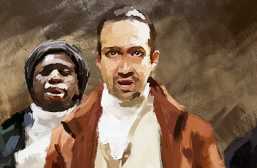
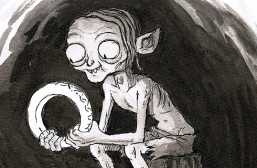



This was a subject that I brought up in a rhetoric class at one point, and I’m glad now that someone took the time to investigate the art of trolling and its impact as a rhetorical tool. A lot of people are skeptical of it as a tool, though I see it is undermined primarily in context for how it is regarded in negative light, as tricksters often are throughout history and culture.
Trolling means so many different things to different people—its evolution over time has made a clear definition elusive.
Ask 10 people what they think about Internet trolls and you’ll likely get 10 different answers.
What surprised me more than anything was that the first use of “troll” as a verb can actually be traced back to none other than noted homosexual Abraham Lincoln during his first Fireside Chat.
I’m not ashamed to admit that I kinda miss flame wars. It was simpler back then, more pure. At the time I was pretty decent at it. I think the last one I was in was actually in a game chat for UnrealTournament 2k3. We were at it for an hour or two and I “won” [insert internet arguing, special olympics pic here] No idea what we were bitching about though.
A lot of people enjoy the kind of trolling that illuminates the gullibility of the powerful and their willingness to respond.
Not only does Trump share trolling attitudes, he has got mad trolling skills!
Hear-hear. Sharing this with friends. Enjoyed reading it. Never knew this much about trolling.
I used to hang out on usenet and in one running group we had our resident troll who tried very hard to be the opposite of constructive at all times and had a particular enmity for the leading light of the group. One day ‘she’ (self claimed) went after this guy and I stepped in and got turned on. It got nasty as a result and ‘she’ began to stalk me which included sending a letter to my employer. Fortunately since it was internet related it ended up on the desk of the IT head who was a mate and who owed me and we concocted a polite ‘fuck off’ letter.
I was very close to consulting a lawyer and getting an injunction as it was becoming very creepy and threatening.
Trolling is becoming an increasingly mainstream phenomenon of contemporary youth culture.
Really interesting article. What most news reports term as trolling is generally “griefing” (making a comment designed to cause a harmful negative emotional response – commenting on the FB page of someone recently deceased, for example). Trolling was originally harmless and non-personal – a practical joke such as the rick-rolling phenomenon of a few years ago, or commenting on the message forums of a rival football team after a big win.
I think trolling gets a very bad press. A well worked piece of trolling can be very entertaining, especially when drawing in some pompous, know it all. The casual, lazy and obvious trolling deserves to be condemned though.
Absolutely. I enjoy a good troll myself, occasionally. It’s especially fun with those posters who will write an essay in response to a single provocative line.
It gets a bad press because it has been linked by lazy journalists to online abuse, which isn’t big or clever.
There is a substantial overlap, though. That’s undeniable.
Not all online abuse is trolling, and not all trolling is online abuse, but they can go hand in hand when somebody decides to troll an article where doing so is both insensitive and highly inappropriate. Abuse isn’t always about the intent to abuse somebody, it can be the result of somebody thinking that harassing a stranger with their inflammatory comments about serious topics of discussion is a good laugh.
There’s a time and a place for trolling. The onus is on the individual trolls themselves to understand when and where that is.
Agreed. There’s good trolling and bad trolling and there’s probably a grey area too.
The Onion is an good example of trolling done well.
It sure is. Also, any history of internet trolling that doesn’t even mention USENET is just wrong.
FFS, words have meaning!
You both are doing basically the same thing the article was mentioning.
The Onion is (well… *was*, when they had a proper budget) an amazing, hysterical, well thought of project. But- IT IS NOT TROLLING!
It is\was a clever satire, a joke, a prank (at worse) intended to only elicit laughs out of their audience. If some idiots are not suited for such a material then their shock is just a side effect.
Unfortunately, Trolls are as necessary a part of the online ecosystem as mosquitoes are to your backyard.
This comparison doesn’t help to support your claim.
All of these are good reasons why anonymity on the internet should die and all users should be required to have displayed their first and last names on every comment.
Signed,
Anonymous person #44
Wouldn’t change things. Go look at people’s Facebook posts and twitter updates, people are stupid and just don’t give a shit. Saying racist, sexist, homophobic slurs and everything under the sun with their name and picture front and center.
I liked the system described in the Ender’s Game series. Like, there were anonymous users and such, but they couldn’t participate in greater forums with people discussing things seriously.
The troll is almost as old as the human itself.
Love it.
My one thought is “troll” came from “trolling” as in a style of fishing. There should be some mention of this.
These internet posters where not glossed trolls because of if the mythical creatures. “Trolls” came from a shortening of “trolling.”
The fishing activity is called “trawling” (dragging a hook behind a moving boat) and was carried over by mispronunciation then just misspelling.
I was about to mention that he meant trawling and disregard the claim entirely but then you came with your indirect support… is there any source on that claim?
Google yields me nothing (at least nothing reputable).
There’s no such thing as a ‘troll.’ A troll is a misnomer for a person who isn’t getting their needs met. Once you’re able to meet the needs of that person, the ‘trolling’ stops. Contrary to the popular misconception, people don’t troll just for the hell of it. They troll as a way of letting you know they’re deprived of meaningful relationships.
Yeah, sounds there’s something to it, but why only relationships? It is basically any injustice done to that person with no way for him to rectify it.
Don’t recall who said that “sarcasm is the weapon of the weak”, but umm…
Sounds like a similar mechanism.
Take away peoples misery and there will be no (well, almost ‘no’) aggression in the world. At least on the personal level.
Urban Dictionary definition is far more accurate than Oxford…
They’re so out of touch!
Urban dictionary expands on it with their second paragraph, but isn’t paragraph a) basically the same in both dictionaries?
Also, how come practical jokes (even malicious ones) are considered ‘trolling’ now?
Was hunting for snipes (and the help offered to newbies) a pre-internet form of trolling?
PS.Oh, joder, I’ve just noticed I’ve responded to a time capsule from 5 years ago, so you obviously won’t read it. Oh well, Ive already typed it, so- “send”…
Trolling is provocative but isn’t always to be taken at face value.
Internet Trolling – a long long time ago – was meant purely as a post/email intended to solicit a response. It wasn’t all necessarily bad, and some of it was quite amusing.
I was once accused of trolling on Chatroulette. I was talking to someone in America about the time, and pointed out that we were currently not on GMT in the UK, but rather BST. They asked, and I explained that BST = British Summer Time, and they said ‘Well played Troll’, and quit the conversation before I could explain no, BST is a real thing.
Fine writing here. I want to note that harassment is bad, and trolling can be bad, but it needn’t be. Sometimes I even enjoy getting trolled just a little bit, but as with drinking and as with art-making, we have to be responsible about it.
Troll responsibly.
The more you learn about trolling, the more you realise how common it is.
Trolling is a lot more complex than just flaming and insults.
Great connections between ancient and modern works. Amazing article!
Trolling isn’t really a modern phenomenon as this article outlines profoundly well (good stuff!). Espousing a deliberately extreme and absurd position in order to provoke an equally absurd and extreme reaction from those one disagress with is a lon-established tradition in satire. Jonathan Swift’s anonymously published essay ‘A Modest Proposal’ provoked outrage in 18th century England by apparently suggesting that the best solution for dealing with poverty in Ireland was for Irish families with too many children to sell them to the English for food.
The point that the (Irish born) author was making, of course was that his obviously contrived and absurd essay was capable of stirring popular revulsion and outrage, but the reality of thousands of families starving to death on the other side of the Irish Sea was treated as an irritating inconvenience and largely ignored.
Adopting an insincere position as a rhetorical technique can be justified and can (when used intelligently) serve to illuminate a debate.
I suppose it’s a question of terminology. When I learned the term “trolling” was a specific thing quite apart from e.g. satire. It wasn’t always out and out malicious, but it was never sincere in its objectives. To call a piece of satire trolling is to insult and devalue the satire. Nowadays people use the word “trolling” so broadly – as anything from straight up insults to just having a different opinion – that it’s in danger of losing all meaning, though to be fair that’s not a process only limited to this particular word.
I would also argue that there’s a very thin line to be tread in using satirical depictions of differing viewpoints as forms of critique.
It has become the go to insult for people who disagree with what another is saying rather than its original point of being someone writing something to derail the line of conversation.
Interesting article. It is just awesome.
Great read.
I remember the days when trolling meant something, when it was almost an artform.
Trolling was not just someone saying something nasty or insulting. That’s flaming.
Trolling is (or was) understood to be the art of saying things (that you don’t personally believe in) that are outrageous to some subset of others, in order to provoke an impassioned response. The troll wins this game by getting the other party to lose it, fling insults and abuse them.
They’ve been around since time immemorial. I can attest to this, hearing them shout down each other over games of Dungeons and Dragons in the University Center in the mid ’80s. Same language, same vitriol, just without the complete anonymity. They existed in car clubs as well. Anything where two guys can on-up each other. When I was in high school it was Dos vs. Windows, and Clone vs. Mac.
They’ll be arguing sticks vs. stones after world war 3.
Are we sure that the level of trolling hasn’t increased as a strategy to stick a few more nails in coffin of net neutrality. People may change their opinion on the governement controlling the net if they think it’s chaulked full of douche nozzles.
The issue with clamping down on internet troll’s to eliminate is that this would require laws to come into play. Then the issue becomes who is a troll. looking at current government stuff going on trolls as we see it and how they see it could be broader and encroach on groups like environmental who petition for changes to oil etc. this opens up the ability to filter our social disobedience.
Maybe the best way to put an end to the worst kind of trolling is to stop talking about trolls altogether.
Perhaps trolling contains a psychological angle that acts as a purging or cathartic agent. It sounds horrible, but the racist, sexist or generically demeaning variation of trolling can be a repressed expression that needs to find some outlet. Thereby the anonymity of the online world allows the channeling out of these dark sinister sentiments.
People like having an enemy and to feel part of a tribe. All humans are trolls.
Trollish behavior has been with humans ever since we started walking upright, and saw somebody slip and bust their ass, which was funny as hell. I don’t even think it’s an anonymity issue anymore, but rather the lack of a system of checks and balances, where people are exposed to other POVs from other actual human beings. The nature of online life, and the practically infinite choices available to people, means that the entirity of that life can be spent perusing only stories, forums, and sites where a person’s POV is reinforced, not challenged. Occasionally, the POV is strengthened by perceived support for it, and boundaries are pushed further and further out. What worked in the past will work now, so why not spew hatred towards this complete stranger, when it got tons of LULZ! the last time the person did it?
The best way to change problematic behavior among a group is for the members of the actual group to start calling out other members for being assholes. If trolls don’t other trolls to say “what the fuck do you think you’re doing?”, they sure as hell won’t listen to anybody else who already knows it’s shitty behavior.
AOL chatrooms were a great place for a young troll to learn. I remember fondly trolling perverts. Went through so many AOL minutes doing this.
There are plenty of examples of people speaking provocatively in order to get people’s attention a little bit. It makes you go, “Huh? What?” And then listen a little better because their argument is set up as a “justification” for this absurd conclusion, which is presented first so that you’re inwardly daring them to justify it.
Great article. Well written and researched. Especially the history of trolling, connecting the past with the present, shows how integrated trolling is into human societies.
Trolling means so many different things to different people. Great article.
alt-right trolls are so crap – they are so bottom of the barrel, like you should look at some more a d v a n c e d stuff SRLSRLY.
Trolling is occasionally a sane response to the insane stupidity on the internet.
thanks for the article 🙂 Great read about trolls
I would never have thought to consider trolling in relation to historical figures and mythologies. Really fascinating article.
I think the most interesting part about the definitions cited is that they all hinge on ‘intent’. How do we know the intent of a person on the internet enough to label them a troll? Does the alleged troll get to dictate their intent or can a group of people analyse the text and determine intent? If there is manslaughter as murder without intent, is there such thing as trolling without intent? Mantrolling?
A very well thought out and thoroughly researched piece, although I must say the word ‘rhetoric’ lost its meaning to me at about the fourth paragraph.
Keep up the good work!
Just remember…
Never. Feed. Trolls.
The End.
Good work. I like it
This made me think of the ancient roman graffiti found in Pompeii. There were numerous examples of the kind of juvenile banter we put on bathroom stalls to this day, or send to each other anonymously in the comments section of a youtube video. I think trolling has probably been pervasive in every society through history.
This is the first thorough and serious investigation of what a troll is that I’ve ever come across. By taking it seriously, in a way you’ve de-fanged a figure that has been granted too much power over emotion and discourse, especially in the last couple of years.
I like the broad approach, including James Veitch, fictional characters and history and mythology. Very interesting and entertaining.
🙂
Internet trolls will always be present as long as there is anonymity.
What a fascinating history you have provided here. I learnt a lot from this. Thank you.
A fascinating discussion on a topic I had not considered before. Thank you.
Trolling has become a bizarre rhetorical tool that’s almost impossible to argue with because its roots are irrationality and absolute statements-thanks for researching this!
I think the problem is the word “trolling” it covers too much from clever to offensive to disturbing. There is a need to distinguish the creative from the crude.
Fascinating article! Much like N.D. Storlid comment, I also encountered Socrates’ trolling nature in an Ancient Rhetoric class in my undergrad, but its nice to see the full history mapped out.
A concern often glossed over throughout the article is that sophistry was a form of education, a convention practised by the aristocracy of Ancient Athens. Part of what Socrates is trying to do is to address the lack of morality or civic duty in the education of the Sophists. The political message of the Sophists, for Socrates, is empty as sophistry employs argument for argument’s sake and to no higher end. Modern trolling as portrayed in the article is an almost covert attempt to achieve political ends or voice political concerns.
So while I did indeed enjoy the history of trolling founded in conceptions of rhetoric in Ancient Greece, an elaboration on the comparison of political ends in ancient versus contemporary trolling would prove useful, as the latter has manifested in response to political questions.
This section I’ve copied from the article is fantastic. Without people to bring Satire to certain ridiculousnesses, it would be hard to look at the other side of things. Trolls force us to look at the flip side of what’s popular, tilt our heads and wonder. The author perfectly describes that here.
“Their politics may occasionally be questionable, condemnable even, but internet trolls occupy a position alongside cultural borders that allow the rest of us to better understand our roles within society. Like the Athenian Philosophers and the Tricksters, they bring ideologies into focus, into conflict. The internet troll calls back to the mythological past of various global cultures and forces us to consider what kinds of future may lay ahead for us. But equally important, if we do let the internet trolls point the way ahead, we must consider, as the Sophists did, what other alternatives exist beyond the borders that trolls make readily apparent.”
Reading this I was suddenly reminded of the ways that trolling have permeated into life outside of the internet, especially when it comes to children. When it comes to the “stop touching me” argument, kids often like to argue that they aren’t touching the person but their clothes. Is there an innate feeling for all kids to do things like that, or is it something conditioned in individuals?
I never thought that trolling could be so.. scholarly. Truly made me think about something I can earnestly say I have never before thought of.
Great article!
69 comments…nothing a little bit of trolling can’t solve
This article made me think about trolling much differently. I disregarded trolls as idiots with too much free time but indeed this thorough deconstruction of rhetoric and trolling opened my eyes to not just see the stereotypes. Thank you, sir.